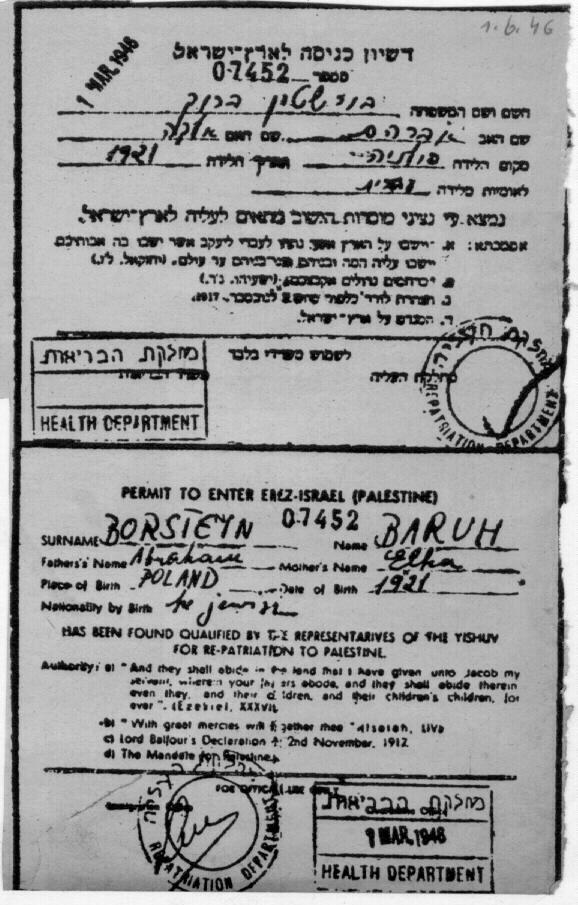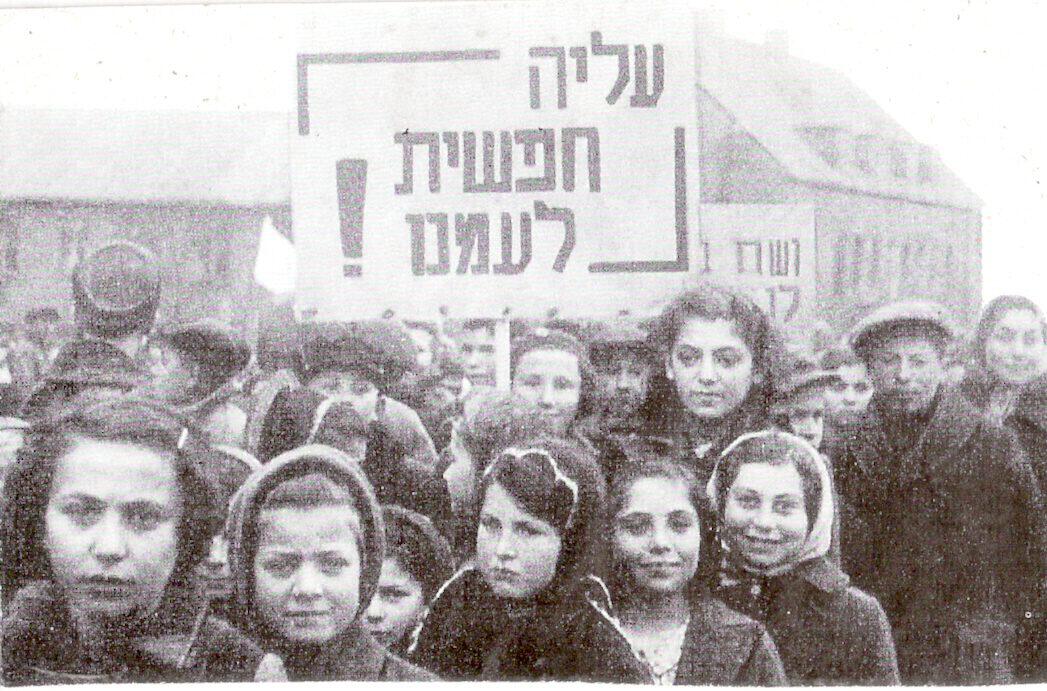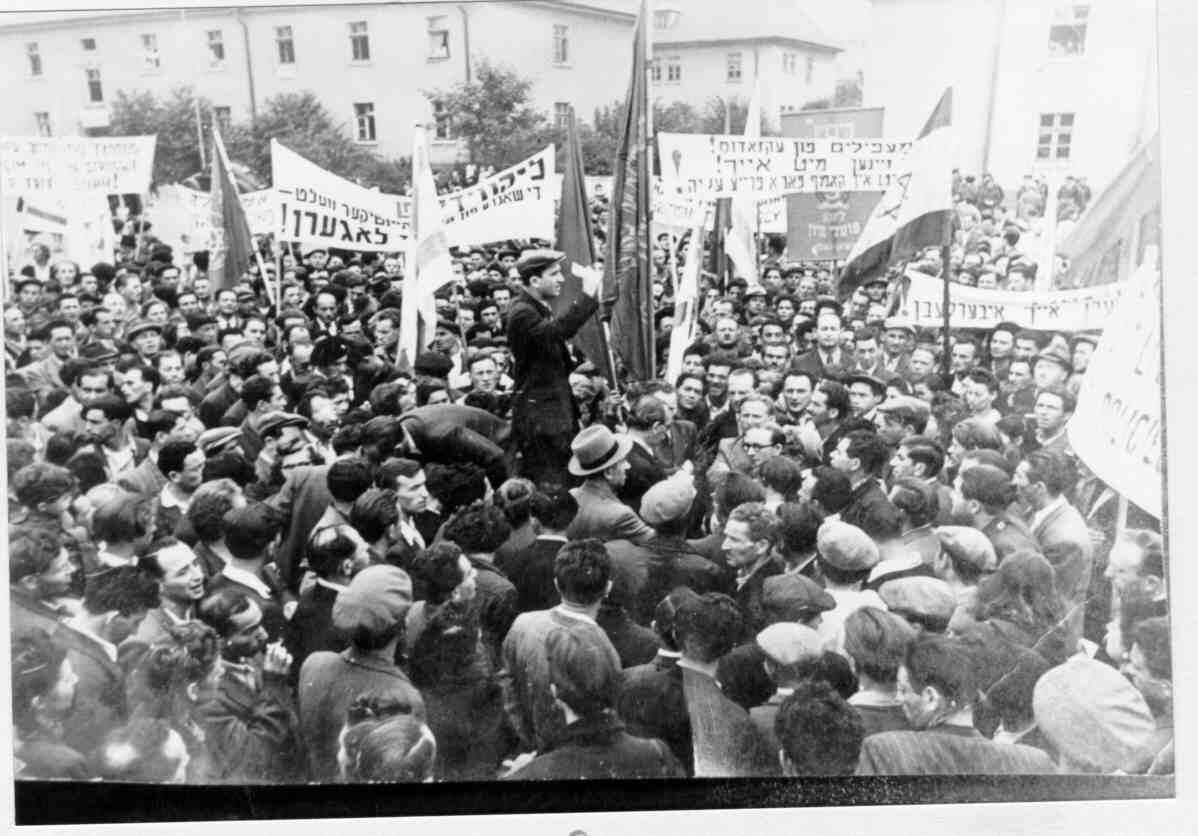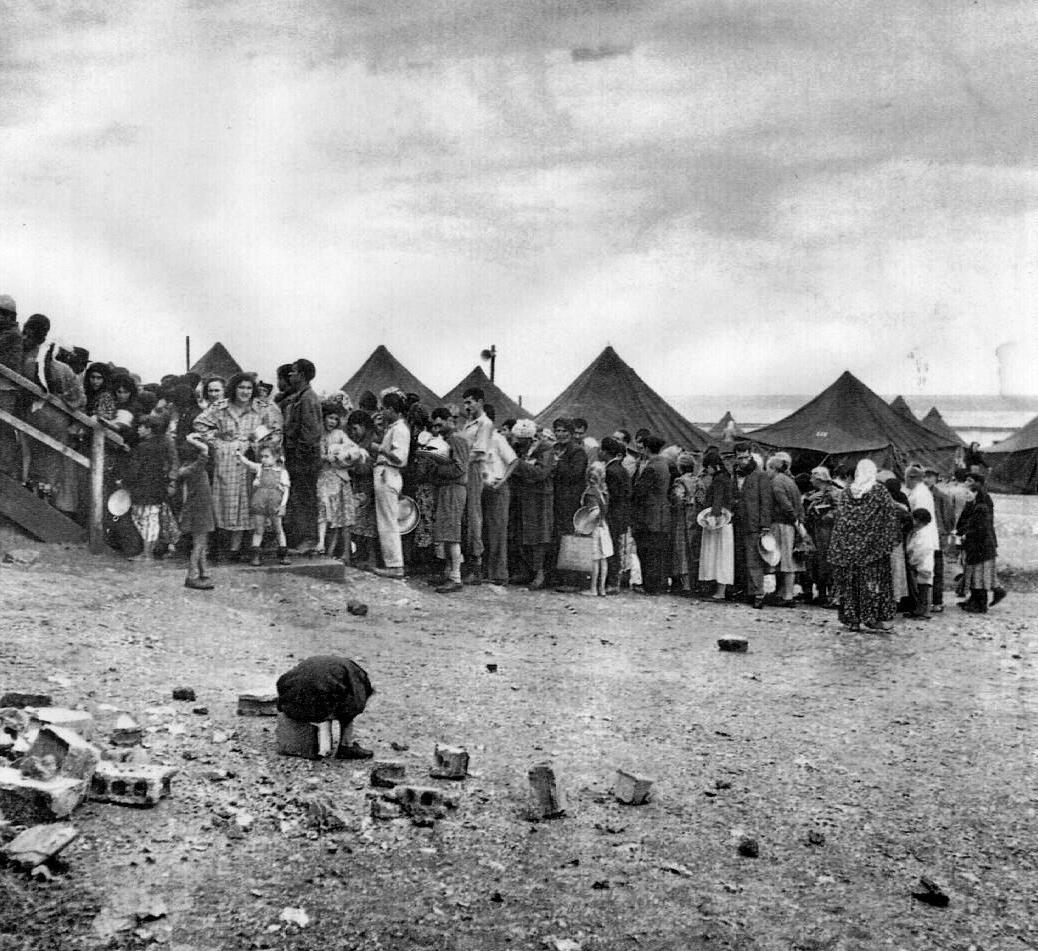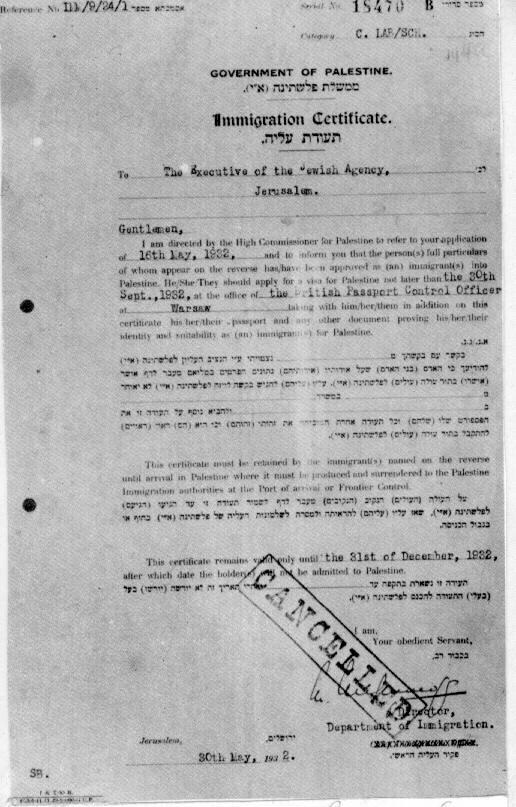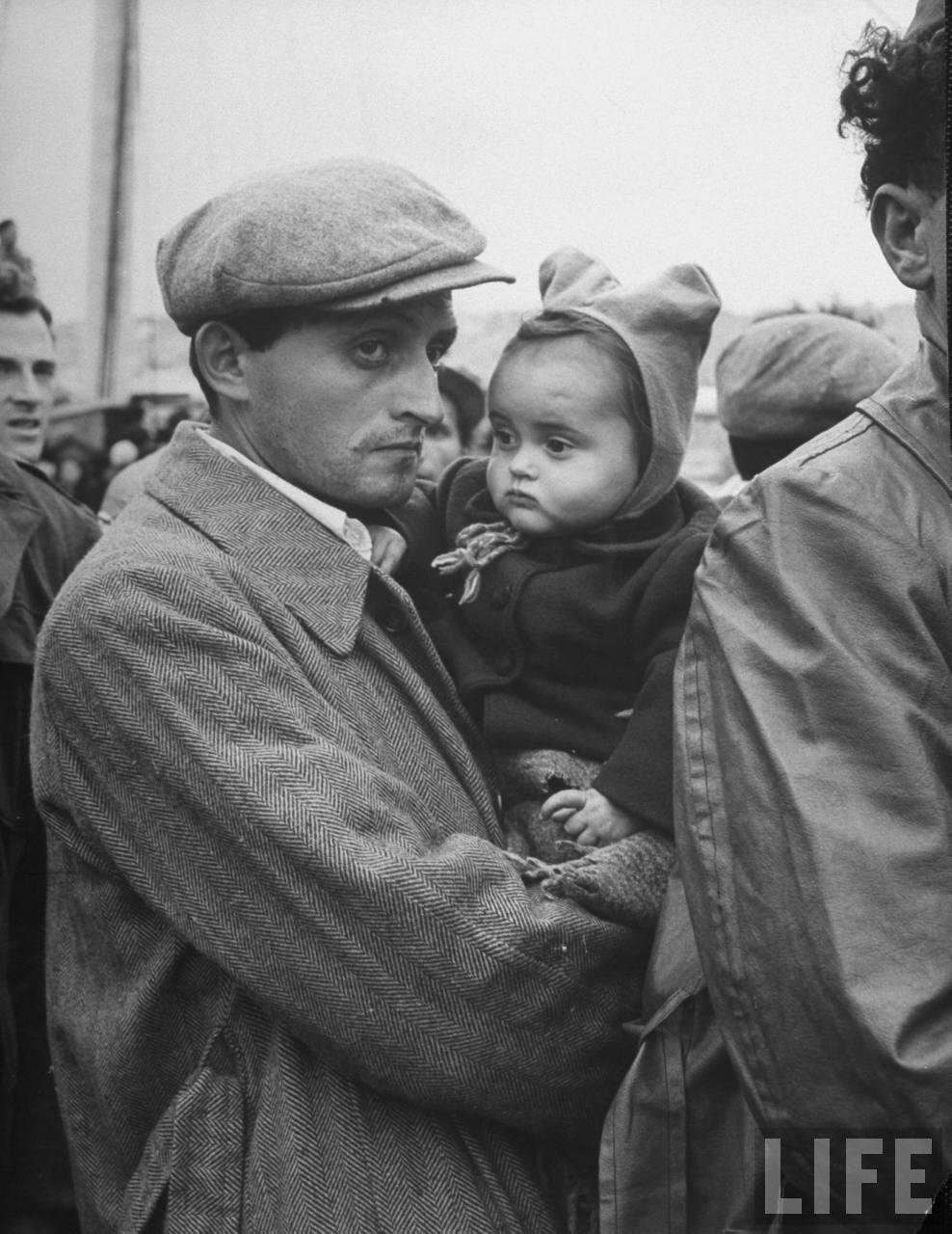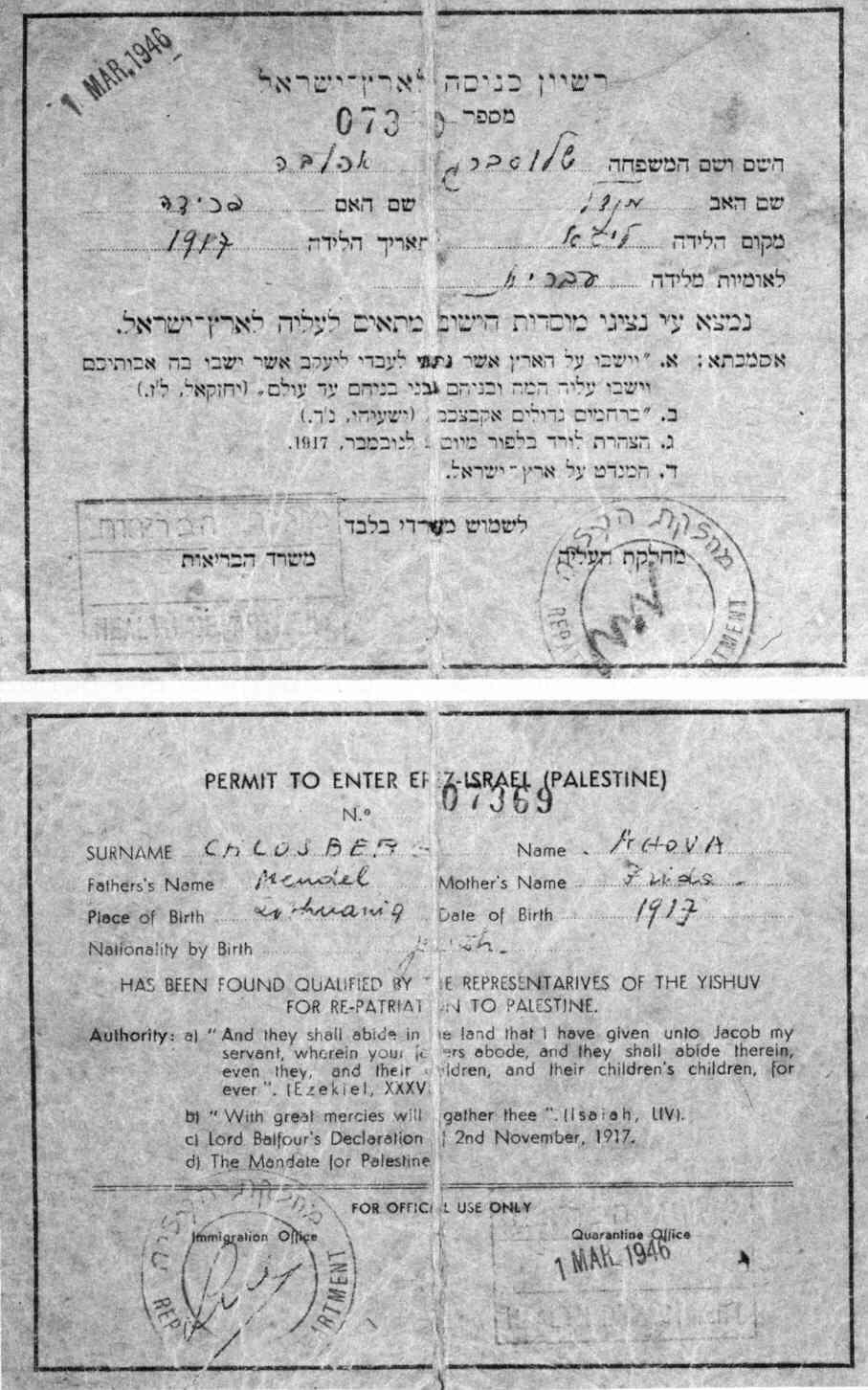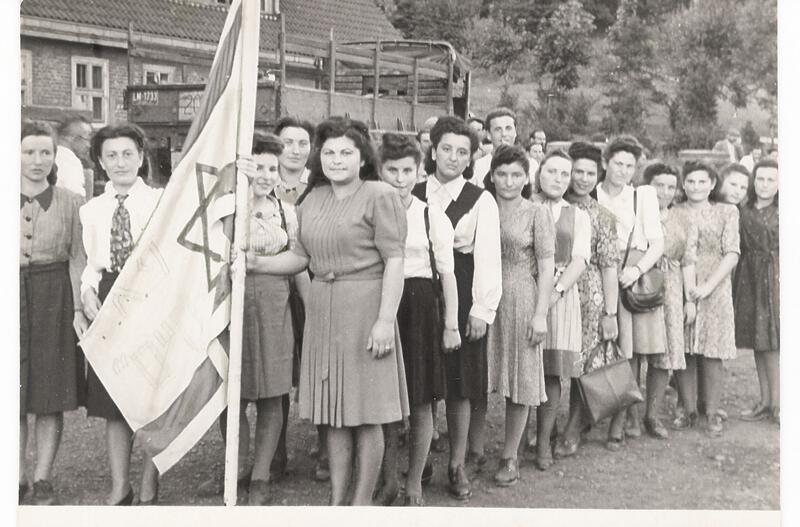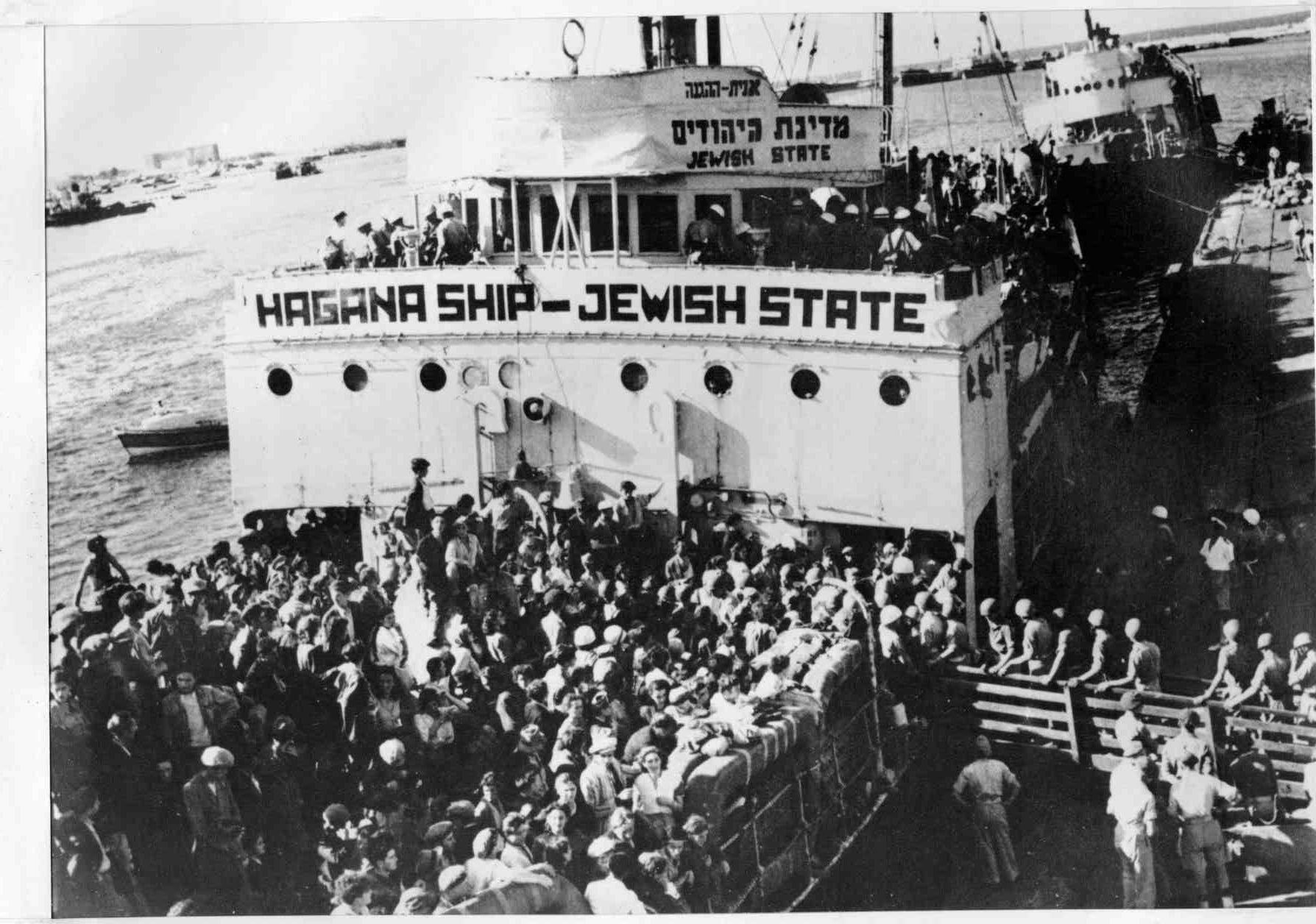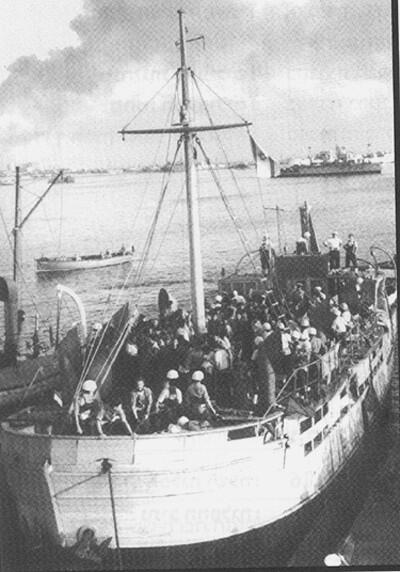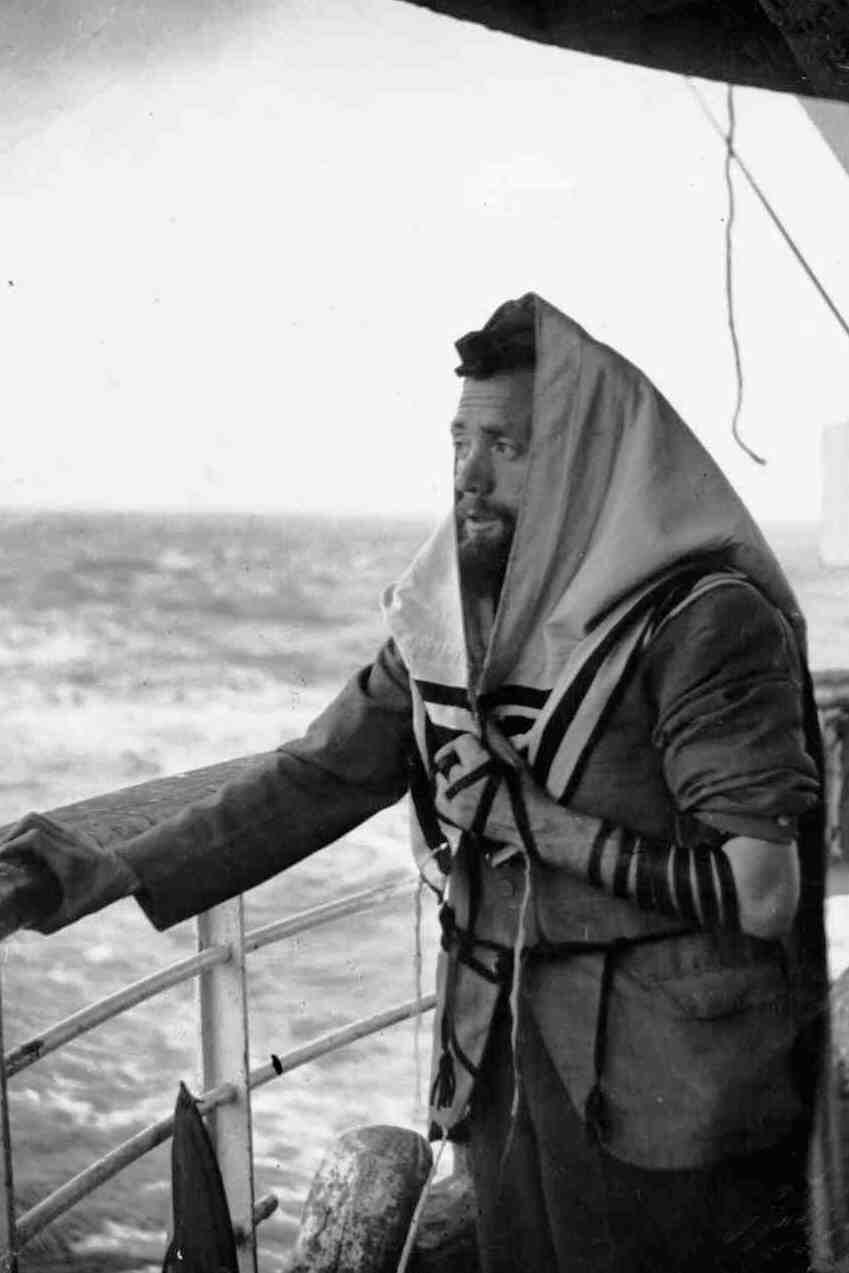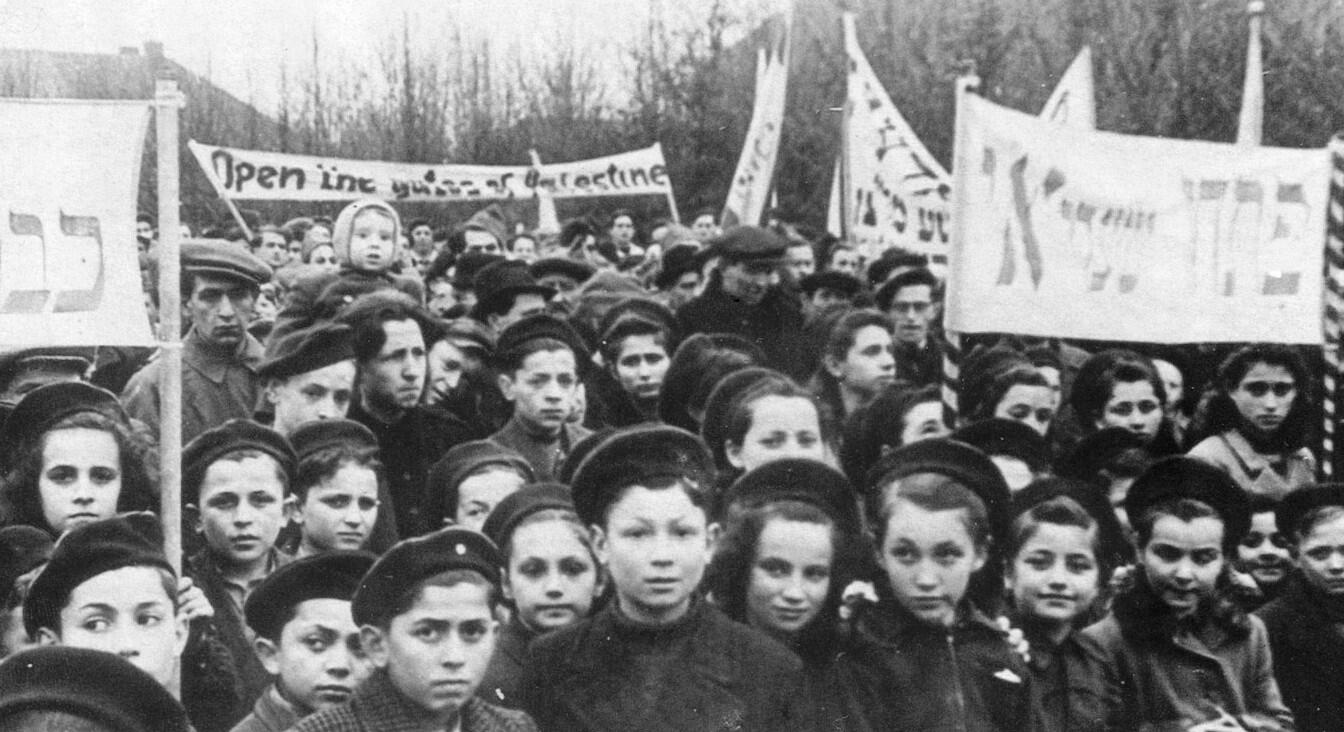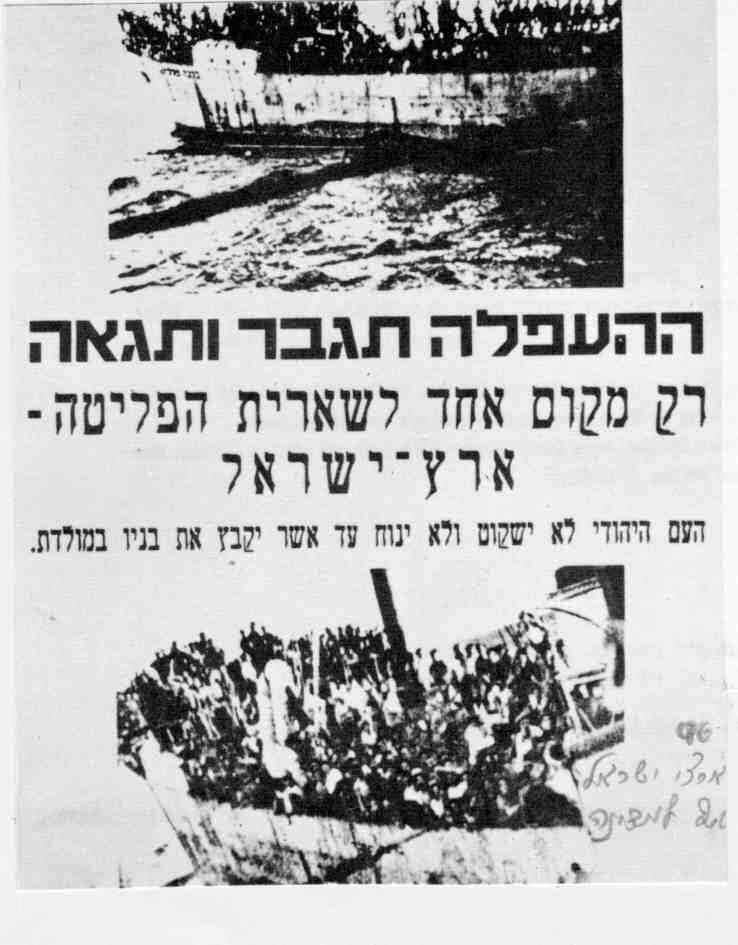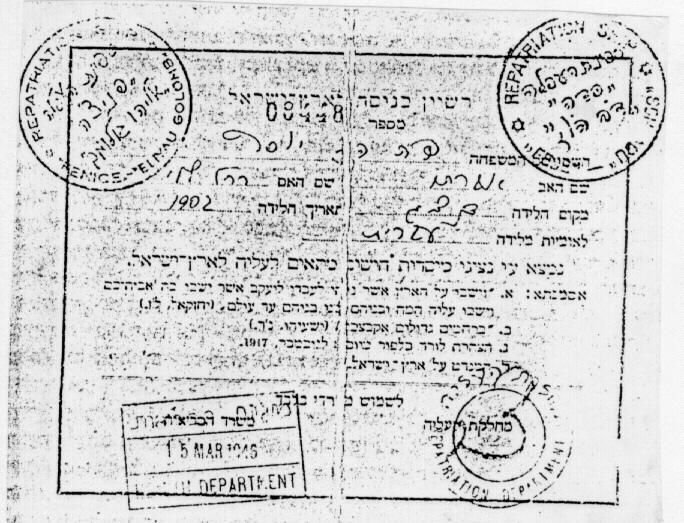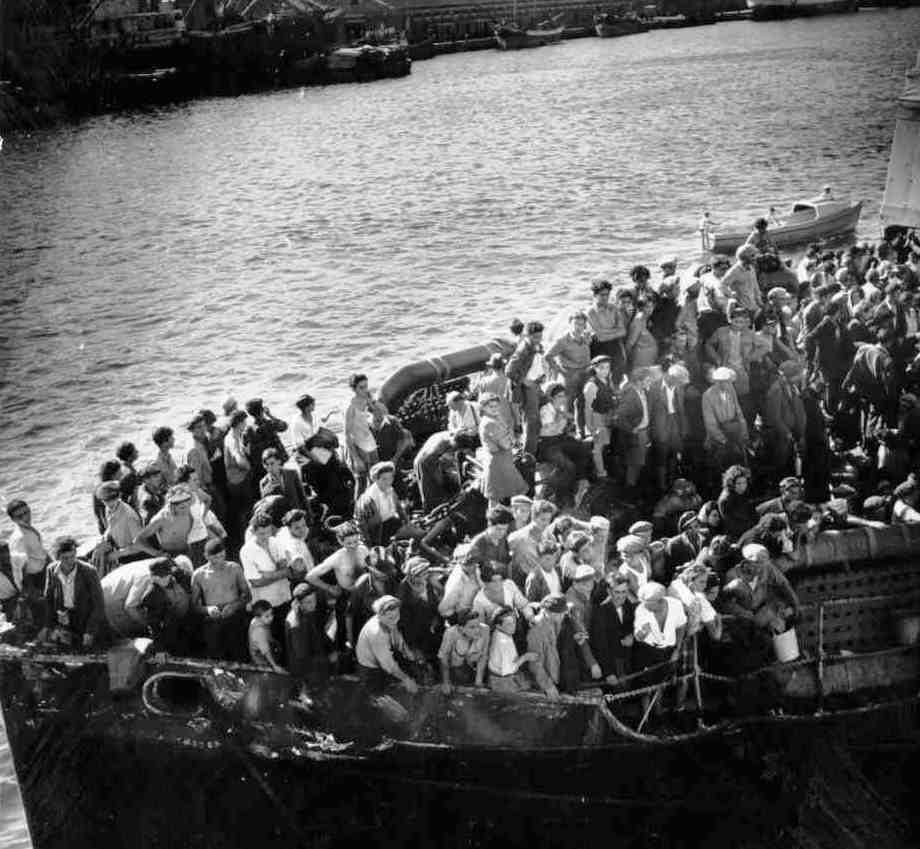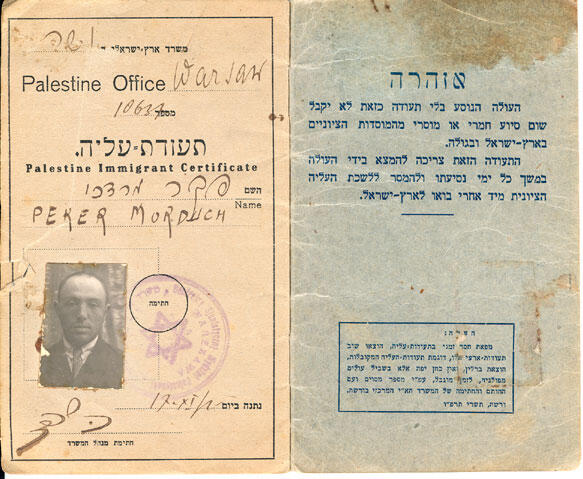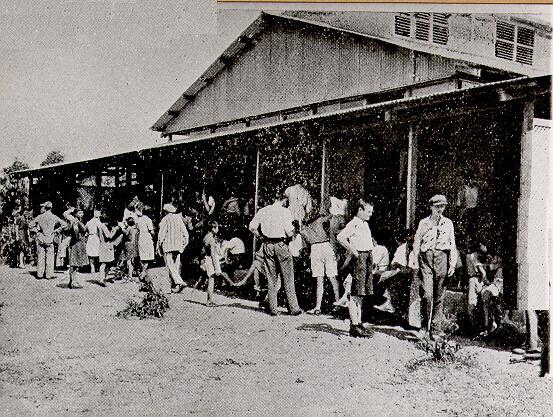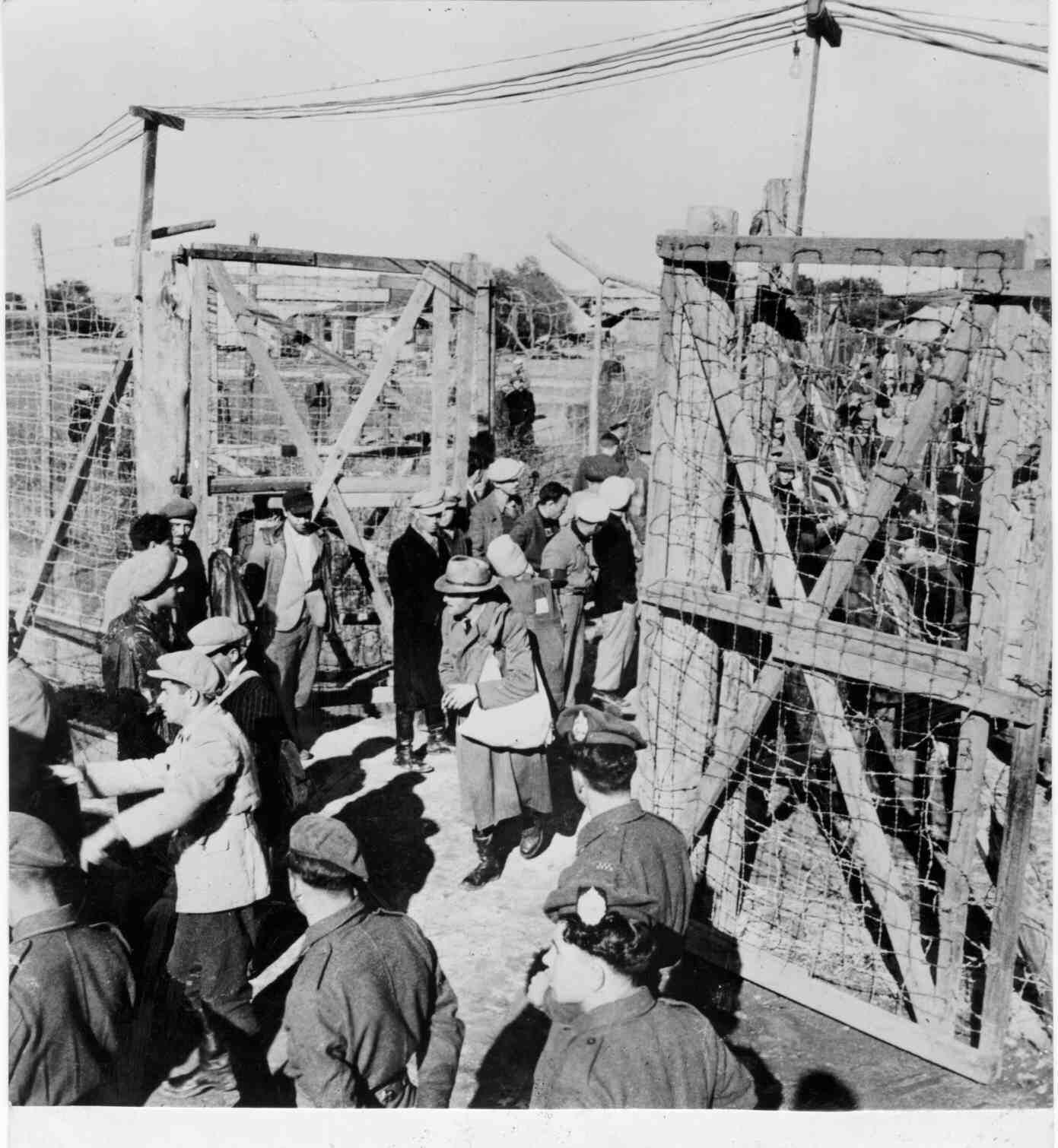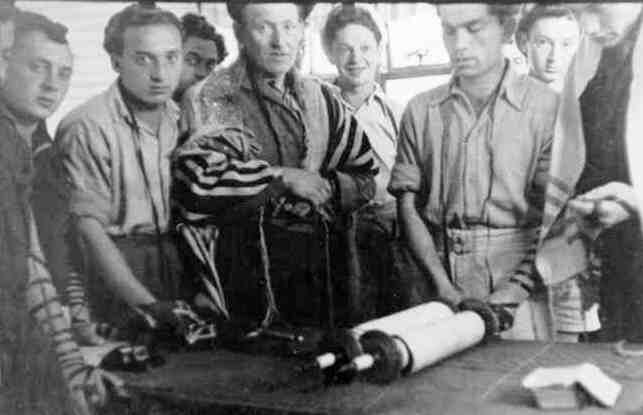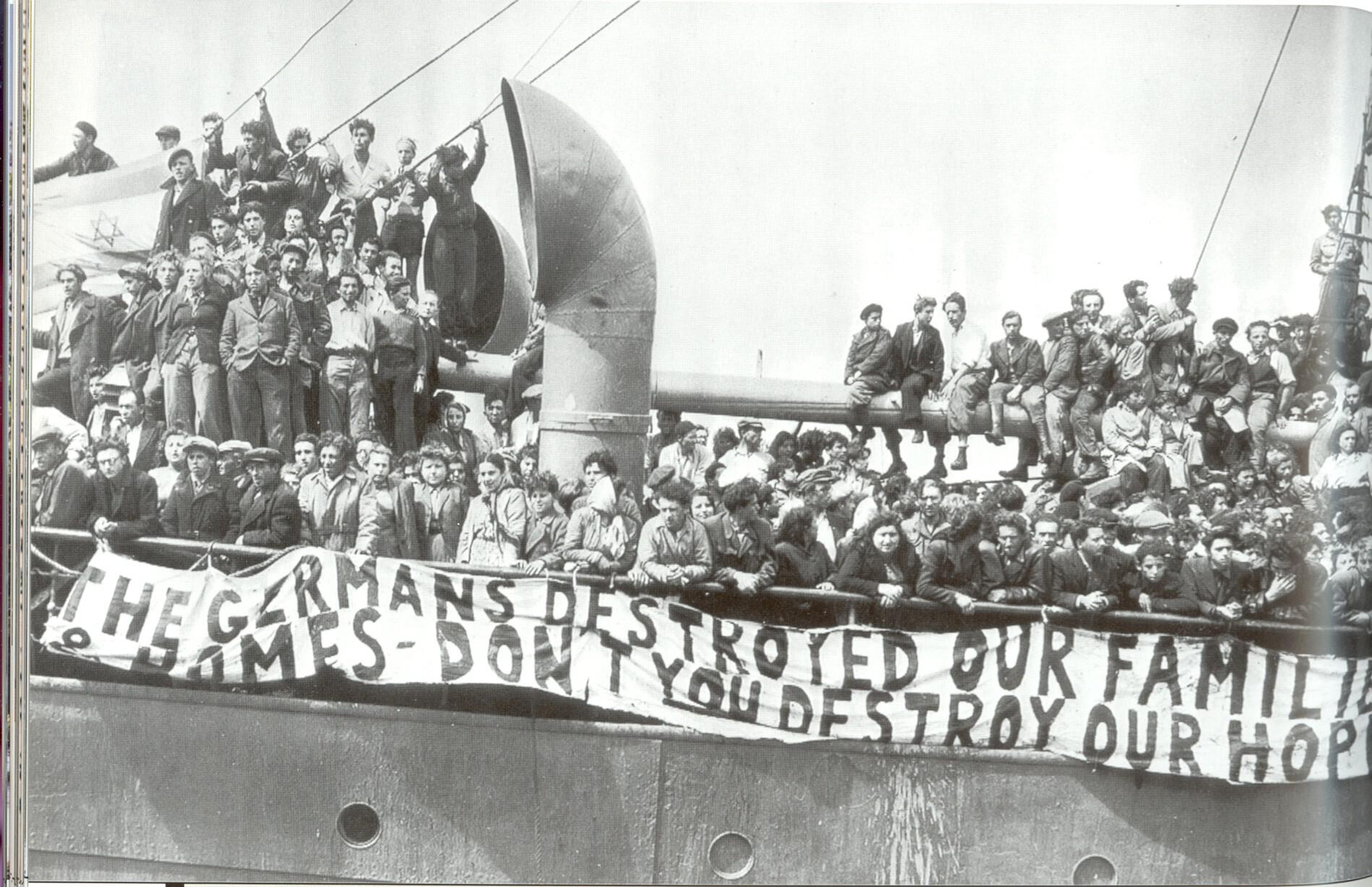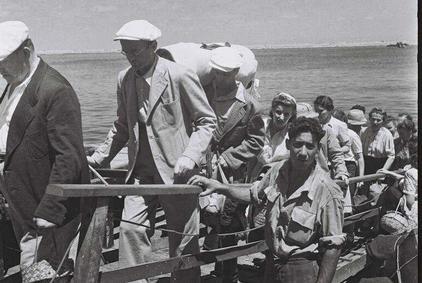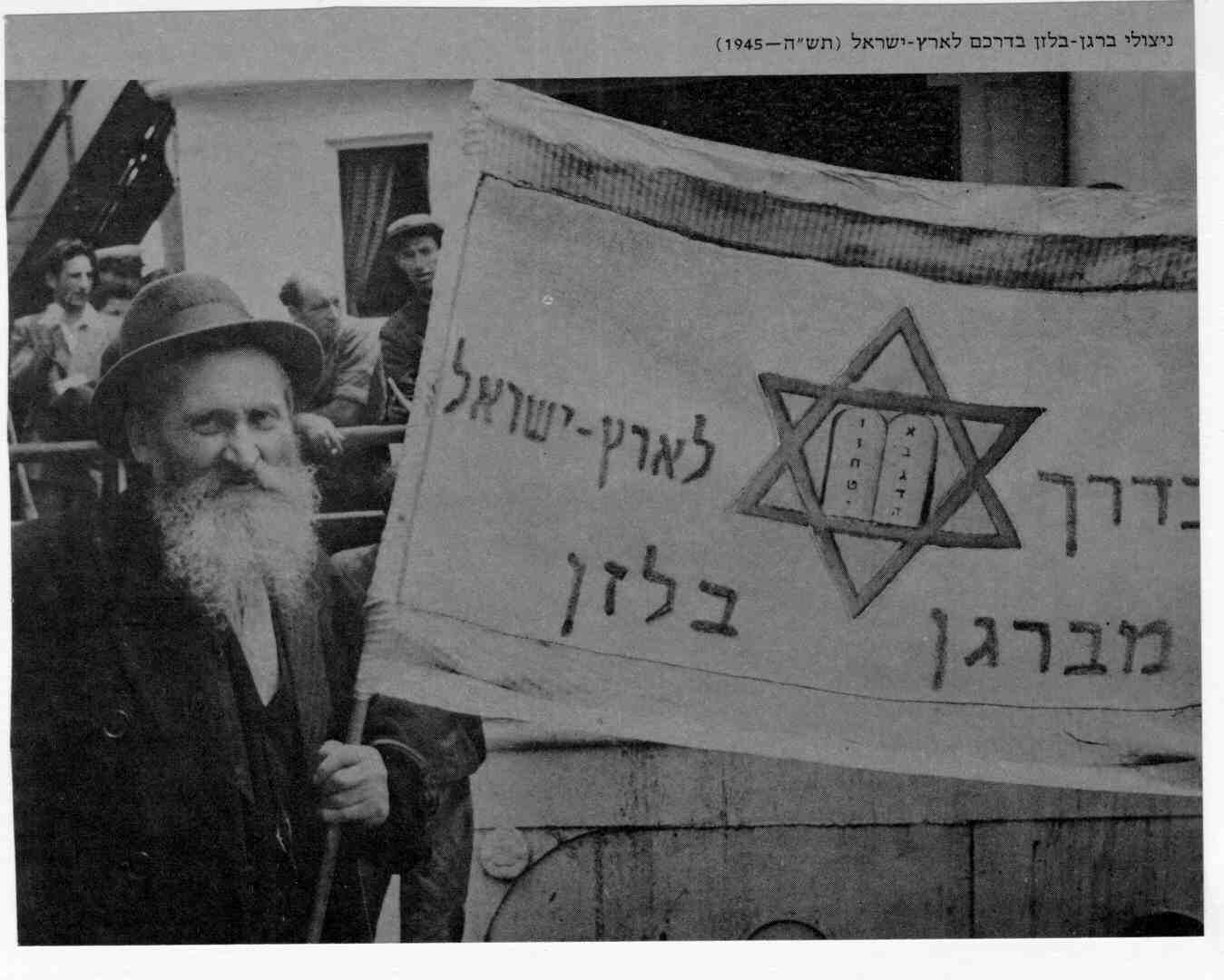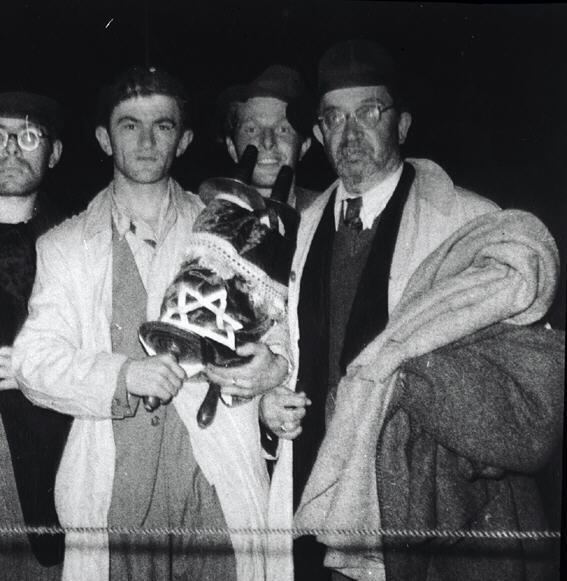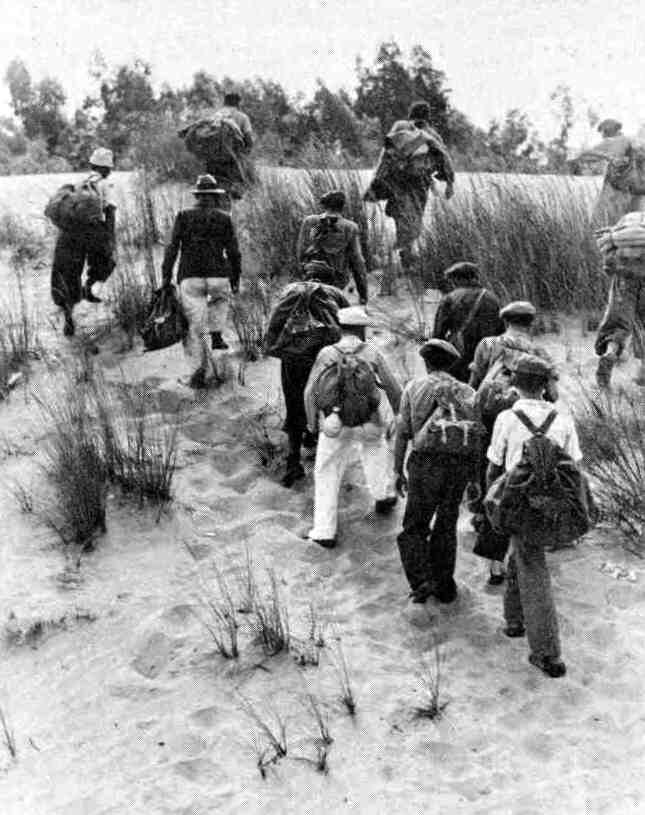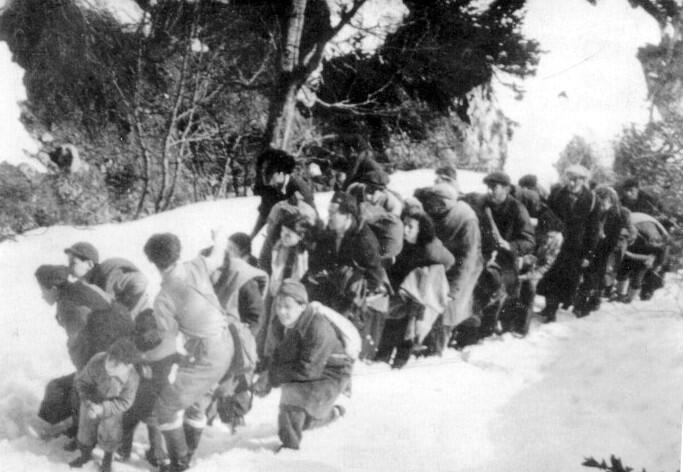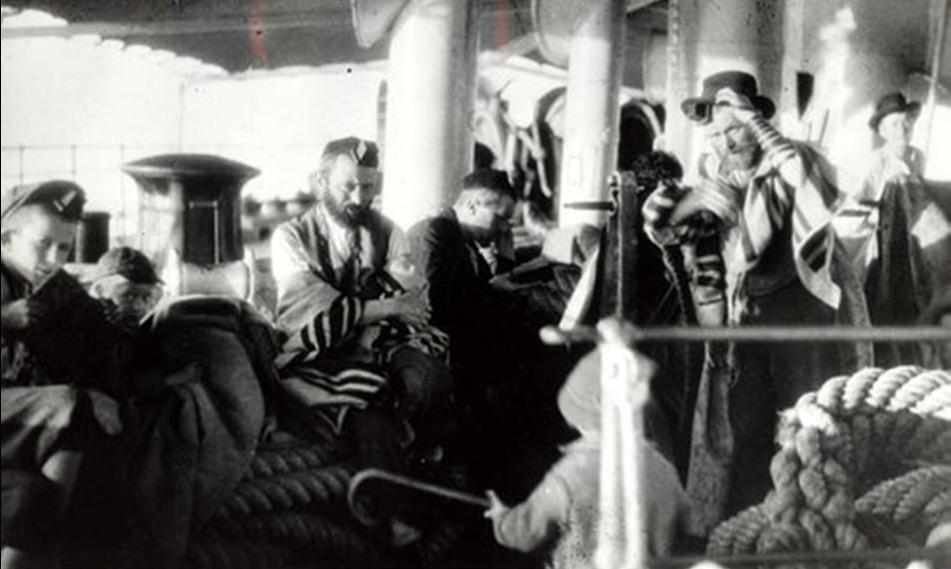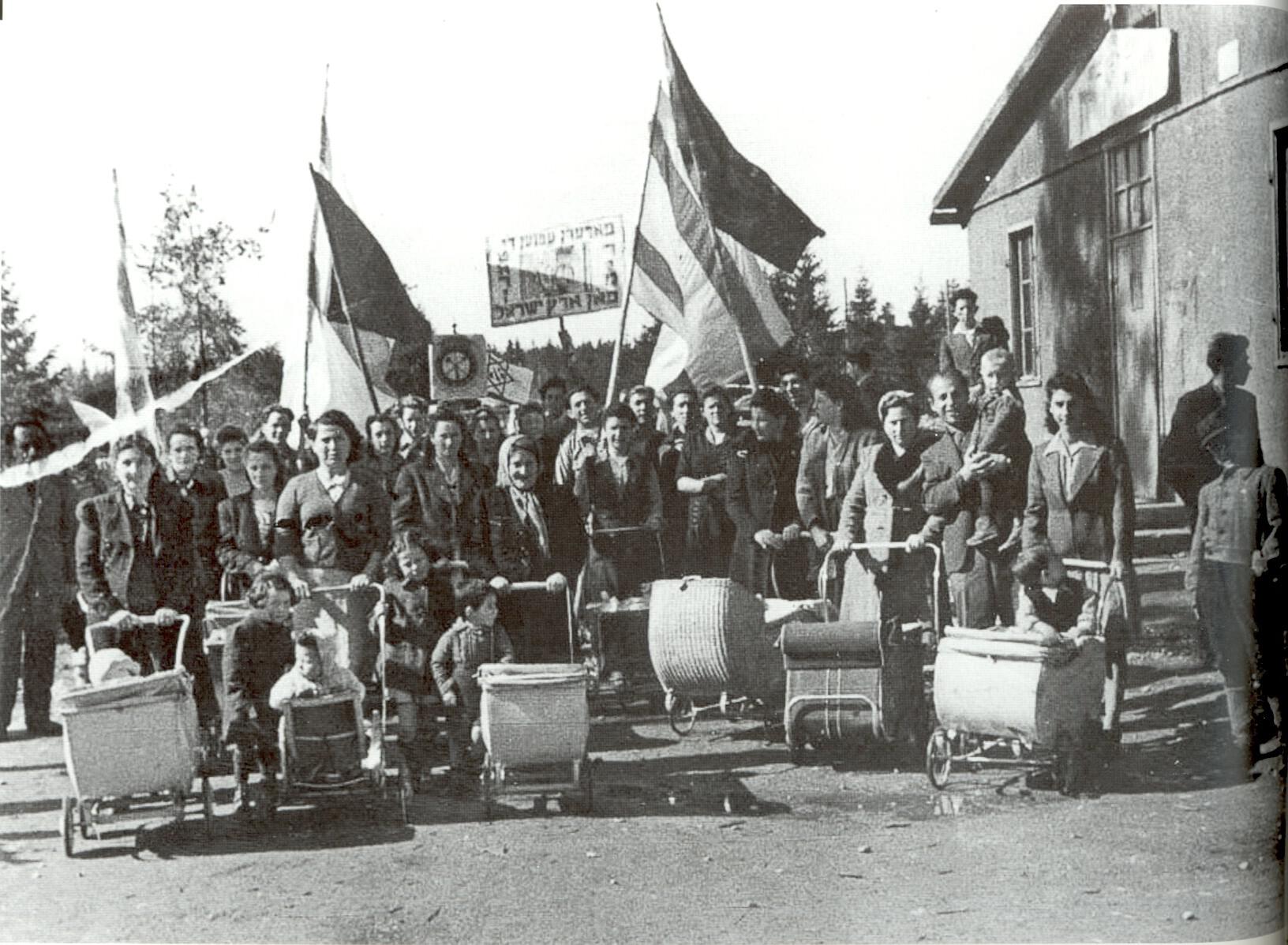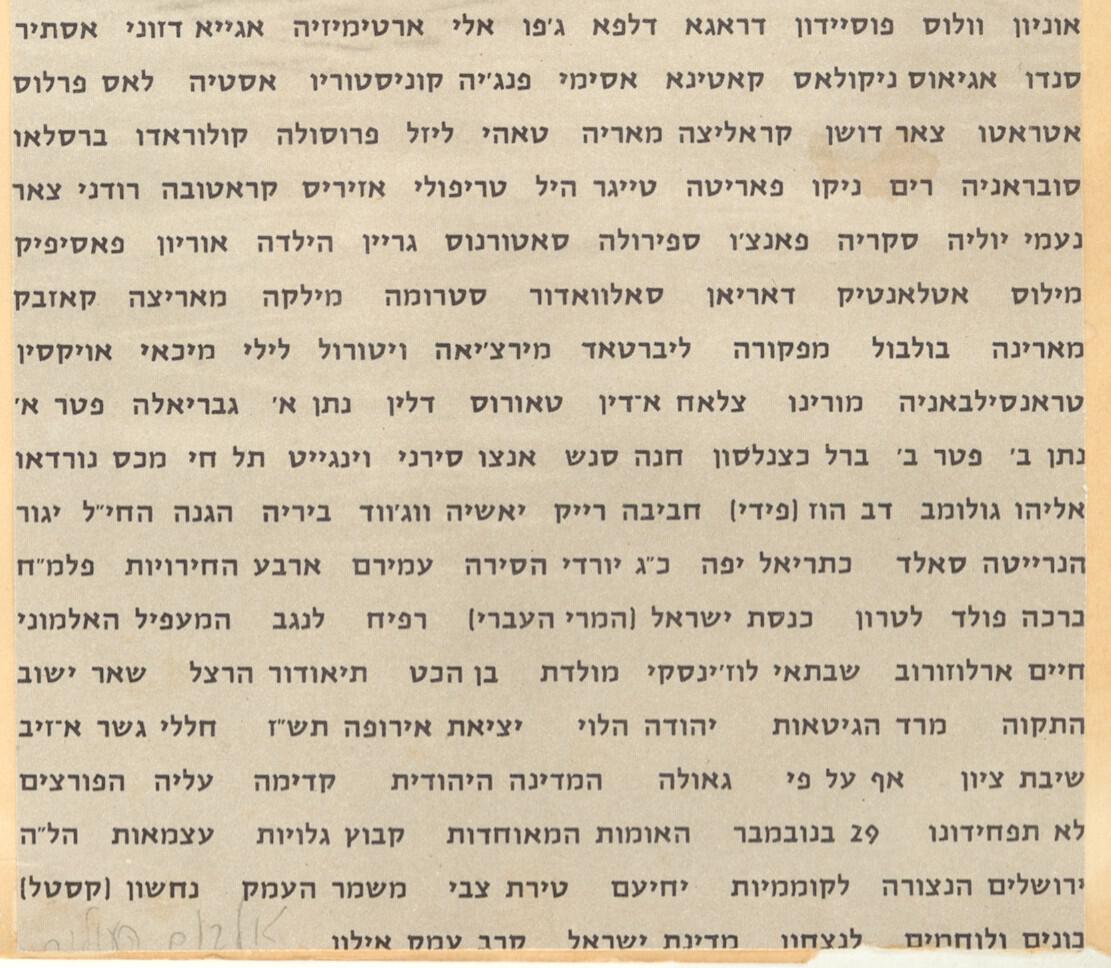
Surviving girls in the Ulm DP camp, Germany, protesting against Israel’s closed borders. They carry banners stating “Free Immigration to Palestine for every Jew” and “the land drenched in blood”
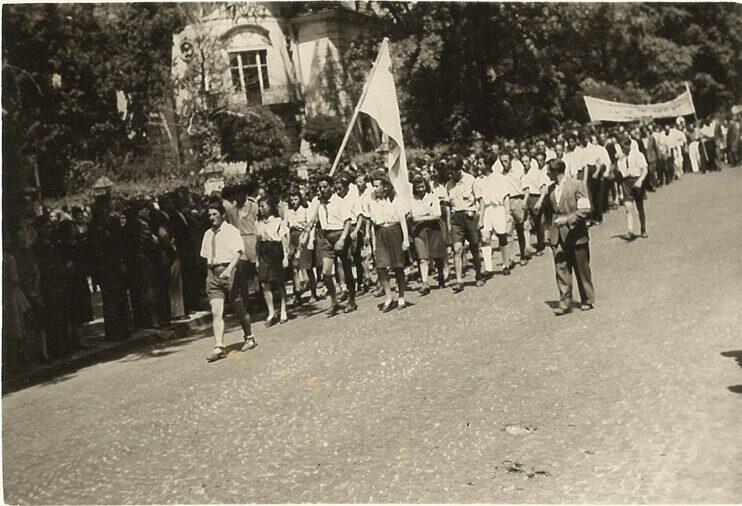
Holocaust survivors marching in support of President Truman and opening the border of Israel. The sign they are carrying reads “Until when will we live idle lives in the [DP] camps, open the gates of Palestine!”
After It All and Despite It All – At the Gates of Israel
Natan Ginzberg, born in Tarnow after the outbreak of the war, was taken to the Tarnow Ghetto and from there to the Plaszow camp. From Plaszow, he was transfered to Mauthausen in Austria and then on a death march to Gunskirchen, where he was liberated. Following liberation, he continued on to a refugee camp in Italy where immigration to Israel was being organized.
And thus he wrote in his book "A Mother's Prayer:"
Right after Passover 5706 (1946) I signed up to immigrate to Israel. I joined a large group of about eighty religiously observant young men, under the leadership of Rabbi Leibel Kutner. Rabbi Leibel was a Gur Chassid, and even though he lost his wife and children in the camps, he did not lose his zest fo life, energy, and disposition. He was a leader in the full sense of the word, and took care of all our physical and spiritual needs.
On the night that we were going to the sea, there was great excitement. We set off secretly at nightfall. We got into small boats, and they took us to the heart of the sea. There we climbed rope ladders on to the ship "Arba Charuyot" (Four Freedoms) which sailed to Israel illegally. The journey on the ship was difficult and exhausting. It took twelve days. There were over a thousand people on a ship with the capacity for only two hundred people, the water was distributed sparingly, and when the thirst increased, the desire to eat decreased.
Late in the month of Elul 5706 (summer 1946), we arrived at a distance of about ten kilometers from Tel Aviv, but the English were already awaiting our arrival. A battle began between us and the English. We threw cans and other objects at them and they sprayed us with water from hoses. As expected, the English prevailed. And our ship was towed to the port of Haifa. The sick and the elderly were taken off the boat, and we were sent the next day to the island of Cyprus. I won't forget the terrible cries when the shores of the country faded further and further out of view….
In Cyprus we were imprisoned in "Camp 60" under the watchful eyes of the English. Leibel Kutner neither rested nor was quiet there either. He initiated and established again, with a group of his assistants, a synagogue and a beit midrash (study hall), with regular prayers and Torah lessons. My future wife and I were part of this group. On the evening of the holy Shabbat of Parshat (Torah portion) Shemot, on the night of the 20th of Tevet, we had an engagement feast. The "meal" took place in the makeshift synagogue in the camp as a melave malka (post Shabbat meal).
Every month the English released about seven hundred and fifty people, as part of the about fifteen hundred certificates they had approved for the Jews. Finally it was our turn.
On Friday the 17th of Shvat 5707, we boarded a ship on the way to Israel. The joy was immense. On the ship we held the Shabbat night prayer and a celebratory Shabbat meal out of supreme happiness.
At ten o'clock in the morning on Shabbat, the week of reading Parshat Yitro, we entered the port of Haifa. The passengers of the ship hurried to get off, but our leader, the "Tzadik" (righteous person) Leibel, stood up and announced that getting off the ship would mean desecrating Shabbat, and therefore we must stay onboard until the end of Shabbat.
The English suspected that this was a secret plan of rebellion against them. They threatened us that they would send us back to Cyprus, but we stood our ground. "When three stars appear in the sky we will get off the ship," Leibel promised them.
And indeed it was so. We stayed on the ship, had a Shabbat meal there, learned Torah, sang Shabbat songs, and then prayed the Mincha prayer, ate shaleshudis (the third Shabbat meal), and prayed the Aravit prayer. We even managed to do havdala (ceremony at the end of Shabbat) on the ship, and immediately after that we disembared. When we finally entered Israel, a "celebratory and supportive" welcome awaited us… From the ship we were led in a convoy - a tank in front and a tank in the back! - to the Atlit detention camp.
The account of the stubborn refusal of about a hundred religious young men to get off the English ship on Shabbat made its waves throughout the country and appeared in the newspapers. This act sanctified the name of G-d in many and raised the view of Shabbat amongst the greater public.
We were released after about a month in the Atlit detention camp. Be began to organize ourselves and contacted the offices that helped the new immigrants with absorption and acclimatization in the country.
A Mother's Prayer - The Holocaust - In Complete Faith - Natan Ginzberg, published by Ganzach Kiddush Hashem
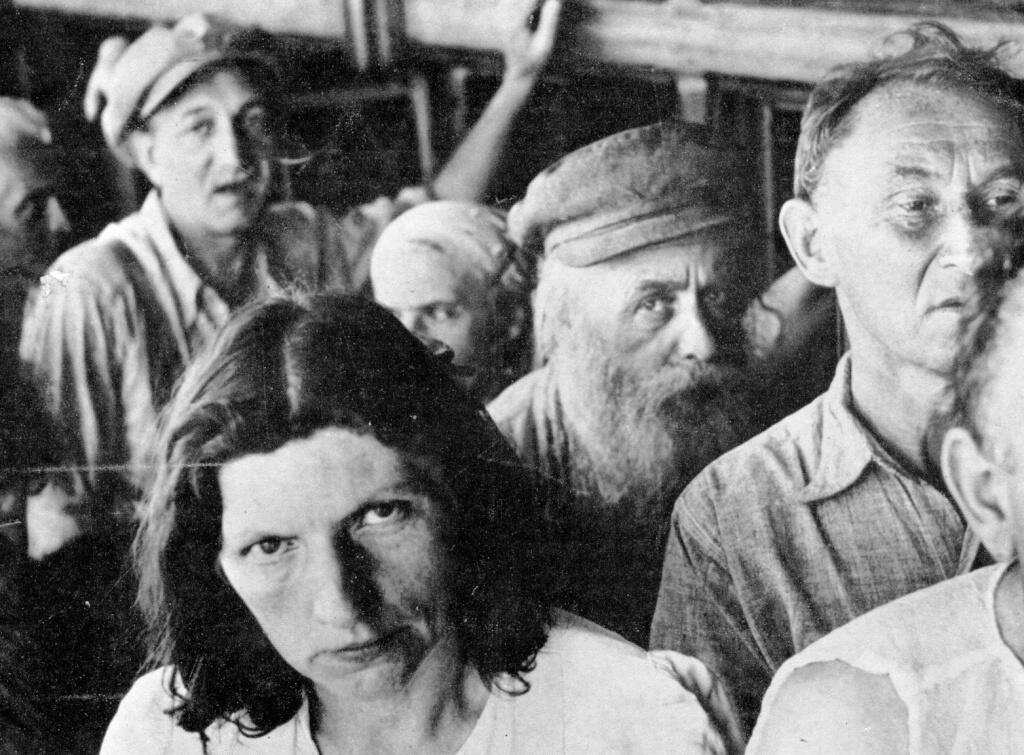
Refugees from the “Atlantic” ship arriving in Israel after being sent on December 9th, 1940 to the island of Mauritius, where they sat waiting for five years

Jews protesting in Warsaw, Poland, against the White Paper barring Jews from entering Israel. Amongst the rabbis at the front of the picture are Rabbi Tzvi Yechezkel Michaelson and Rabbi Yitzchak Meir Kanal
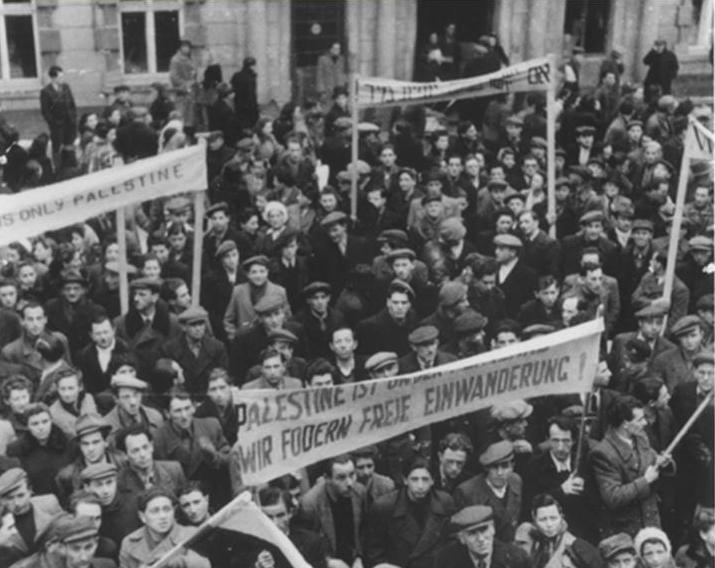
Jews protesting in Badgastein, Austria, in favour of immigration to Israel and against the unfair immigration policy
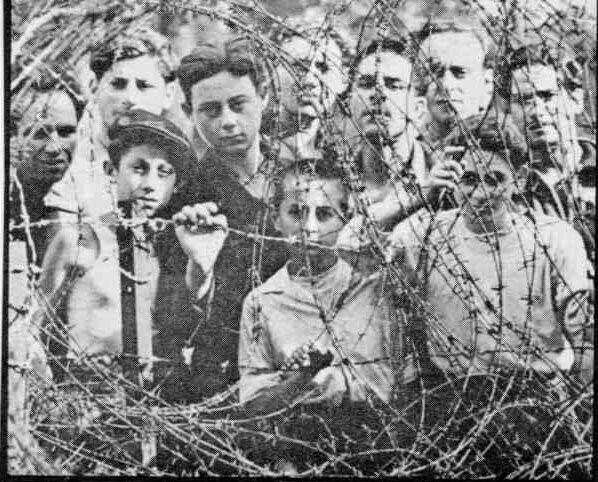
Illegal immigrants, amongst them children, behind barbed wire in a Cyprus internment camp
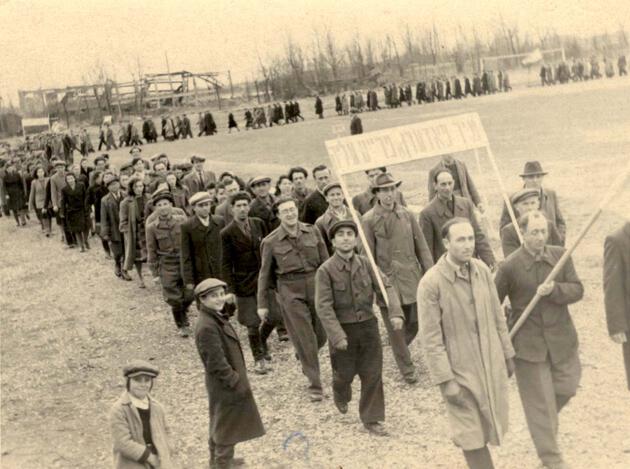
Survivors in the Leipheim DP camp, Germany, take part in a demonstration in favour of opening Israel’s border
The Journey of the “HaMaapil HaAlmoni” Ship
In 5707 (February 1947), I received a telegram from the Aliyah Bet (illegal immigration to Israel) office that I must get to the high-speed train, which traveled at night, to a place near the port city of Marseille, France.
From there, a group was about to sail to Israel in one more day. My brother Yitzchak and I decided that we were going…
We set off with the high-speed train and arrived at the appointed place, and a day later we were on the ship sailing to Israel. We could not hide the excitement that gripped us. Here, G-d willing, we have won. The dream is about to come true, very soon, our feet will stand at the gates of Jerusalem.
We boarded the ship "HaMaapil HaAlmoni" (The Anonymous Illegal Immigrant) and through the door a huge crowd of people began to flow, cramming into the belly of the narrow ship. Hundreds of people, women and children, entered. It was double or multiple times the amount that the ship could carry. Only when the door finally closed, and we could not move in our seats due to the terrible crowding, did we hear a sigh of relief. In a ship that could fit 60 people at the most - that's what one of the ship's commanders told me, a man from Aliyah Bet - about three hundred people were now sitting.
And we saw miracles at sea: the small ship was like "the few that held the many."
Despite the hustle and bustle, we tried not to complain and no one said that the they did not have enough room.
The "HaMaapil HaAlmoni" ship, despite not having any experience in carrying such a large number of people, moved heavily from its place, and by God's great grace it was able to sail the sea…
The anchor was raised, the ship left its place which was far from the port. The ship was deliberately anchored in this remote place, so that the English would not discover its purpose. The English ambushed all vessels trying to "invade" the country's borders, especially Jews. They strictly guarded the borders following "infiltration" attempts and seized the ships with thousands of refugees on board and sent them to Cyprus.
For reasons of caution, we repainted the ship while on the way. We thought that this would make it difficult for the British to discover our ship. But our efforts were in vain. The English ambushed us from the day we left the port and accompanied us for about three weeks, throughout the journey we made from France to Israel…
After about 3 weeks of tossing and turning on an exhausting journey, shouts of joy were heard throughout the ship, and especially on the deck, "Haifa!" "Haifa!" We called aloud, not believing our eyes.
The deck could not carry all the ship's cargo, but who could break away from it? Who could not feast his eyes on the wonderful sight, observe and see with his own eyes the sea and the Carmel?
Here there are no more chimneys of smoke and stences of burning, no more sights of death, agony, and cries of pain. But in front of our eyes, the land is flat and we are so close that we can almost touch it. How beautiful is this sight, which we see now. What a wonderful feeling… the brown earth with houses and trees and life… life… life… a warm and caressing sun, and a land that reaches out to us and says: come my children, come, come please…
However, a odd thing could be seen around us. Strange silhouettes moved on the back of the waves. To our dismay, we realized that this was the English…
"No." "No," we shouted bitterly. "It's not possible." But the shadows came closer. Now we could definitely make out the English soldiers standing on top of the warships. The barrels of the guns in their hands were aimed at our ships, and they were ready to wage war with us. These cursed people, how could they dare to cut us off from the people of our own country?
Leave us alone, after all the hardships we have gone through, leave us and let us go to our country that awaits us, where we can recover our broken bones and have a little peace.
After the battle we waged against those soldiers, we surrendered, our forces were not sufficient enough for us, and full of sorrow and grief we looked longingly at the shore of Haifa, the gate of our beloved country… We did not understand how these cruel hands did not let us enter the gates.
In the evening the ship switched positions. The front of the boat was facing in the direction of the island of Cyprus.
The cries will not be removed from my heart, the screaming voices and the views that touched us… We stood leaning on the deck railing of the English warship, crying. We watchied with hope and prayer the shores of the Holy Land moving further out of view and we continued to cry bitterly…
In Adar 5707 (March 1947) we arrived in Cyrpus, where I lived for about a year until Adar 5, 5708 (February 1948).
On Nisan 11, 5708 (April 20, 1948), I meritted to establish my home in Tel Aviv, in Israel.
(The Candles that were Not Extinguished - Mordechai HaKohen Deutscher - Published by Ganzach Kiddush Hashem)





















